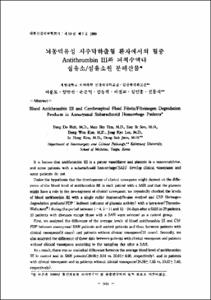KUMEL Repository
1. Journal Papers (연구논문)
1. School of Medicine (의과대학)
Dept. of Neurosurgery (신경외과학)
뇌동맥류성 지주막하출혈 환자에서의 혈중 Antithrombin Ⅲ와 뇌척수액내 섬유소/섬유소원 분해산물
- Keimyung Author(s)
- Yim, Man Bin; Son, Eun Ik; Kim, Dong Won; Lee, Jung Kyo; Kim, In Hong; Jeon, Dong Seok
- Journal Title
- 대한신경외과학회지
- Issued Date
- 1990
- Volume
- 19
- Issue
- 7
- Abstract
- It is known that antithrombin Ⅲ is a potent vasodilator and plasmin is a vasoconstrictor, and some patients with a subarachnoid hemorrhage(SAH) develop clinical vasospasm and some patients do not.
Under the hypothesis that the development of clinical vasospasm might depend on the difference of the blood level of antithrombin Ⅲ in each patient with a SAH and that the plasmin might have a role in the development of clinical vasospasm, we repeatedly checked the levels of blood antithombin Ⅲ with a single radial immunodiffusion method and CSF fibrinogen degredation products(FDP : indirect indicator of plasmin activity) with a latex-test(ThromboWellcotest®) during the period between 1-4,5-11 and 12-24 days after a SAH in 29 patients. 10 patients with diseases except those with a SAH were selected as a control group.
First, we analyzed the difference of the average levels of blood antithrombin Ⅲ and CSF FDP between aneurysmal SAH patients and control patients and then, between patients with clinical vasospasm(8 cases) and patients without clinical vasospasm(21 cases). Secondly, we also analyzed the difference of these data between patients with clinical vasospasm and patients without clinical vasospasm according to the sampling day after a SAH.
As a result, there was no statistical difference between the average blood level of antithrombin Ⅲ in control and m SAH patients(29.06±3.04 vs. 25.61± 6.95, respectively), and in patients with clinical vasospasm and in patients without clinical vasospasm(26.59±7.65 vs. 23.67±7.40,respectively).
The average CSF levels of FDP is higher in SAH patients than in control patients(18.16±14.36 vs. 1.00±3.16, respectively: p<0.01). It is also higher in patients with clinical vasospasm than in patients without clinical vasospasm. However, there is no statistical significance(28.75±9.91 vs. 21.75±12.07, respectively: p>0.05). In the analysis of the average CSF levels of the FDP according to the sampling day after a SAH, even though the average level is higher in patients with clinical vasospasm than in patients without clinical vasospasm(l-4 days : 31.43±14.64 vs. 27.33±1624, 5-11 days : 23.75±17.68 vs. 18.10±16.32, 12-24 days : 32.50±13.89 vs. 18.82±16.54, respectively), a statistical significant difference was noticed only in levels which were checked between 12 and 24 days after a SAH(p<0.05).
This study concludes that the blood level of antithrombin Ⅲ shows no difference between the control and SAH patients, and patients with clinical vasospasm and patients without clinical vasospasm. Although it suggests a causal relationship between the FDP itself or plasmin in CSF and the development of clinical vasospasm, it does not justfy any valid conclusion.
본원 신경외과에 입원한 뇌동맥류성 지주막하 출혈환자 29례를 대상으로 혈중 antithrombin III를 측정하고 뇌척수내 섬유소/섬유소원 분해 산물들을 측정하여 뇌혈관 연축 증상의 발현과의 관계를 조사한 바 혈중 antithrombin III의 측정치는 대조군과 실험군 및 연축군과 비연축군간에 차이가 없었다. 따라서 뇌혈관 연축 증상의 발현 여부는 개개인의 혈중 antithrombin III의 차이에 의하지 않는다는 것을 알았다.
뇌척수액의 섬유소/섬유소원 분해 산물들의 측정치는 대조군보다 실험군에서 높았으며 비록 통계학적 유의성은 없었으나 연축군에서 비연축군보다 높았고 또한 섬유소/섬유소원 분해 산물들이 40㎍/ml였던 예들에서는 38%의 환자들이 뇌혈관 연축증상을 보인 반면 10㎍/ml 혹은 그 이하인 예들에서는 22%에서만 뇌혈관 연축 증상을 보였으므로 plasmin 혹은 섬유소/섬유소원 분해 산물들과 뇌혈관 연축 증상의 발현과 관계있지 않나 추측된다.
또한 향후에는 뇌척수액내에서antithrombin III를 측정하여 뇌혈관 연축 증상을 보이는 환자들에서 낮게 측정되거나 혹은 경시적 변동에서 조기에 뇌척수액에서 감소하는 것이 확인된다면 뇌혈관 연축 발생의 기전을 밝히는데 도움이 될 것으로 사료된다.
- Alternative Title
- Blood Antithrombin Ⅲ and Cerebrospinal Fluid Fibrin/Fibrinogen Degredation Products in Aneurysmal Subarachnoid Hemorrhage Patients
- Publisher
- School of Medicine
- Citation
- 허용도 et al. (1990). 뇌동맥류성 지주막하출혈 환자에서의 혈중 Antithrombin Ⅲ와 뇌척수액내 섬유소/섬유소원 분해산물. 대한신경외과학회지, 19(7), 945–954.
- Type
- Article
- ISSN
- 1225-8245
- 파일 목록
-
-
Download
 oak-bbb-1608.pdf
기타 데이터 / 509.48 kB / Adobe PDF
oak-bbb-1608.pdf
기타 데이터 / 509.48 kB / Adobe PDF
-
Items in Repository are protected by copyright, with all rights reserved, unless otherwise indicated.